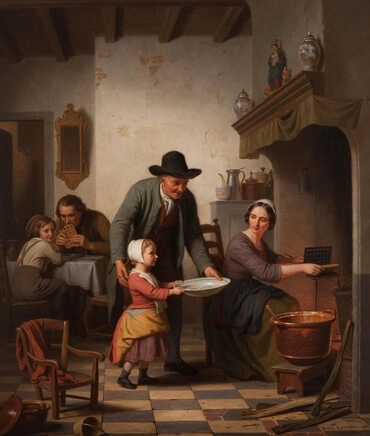9370. EXODUS 24
1. And He said unto Moses, Come up unto Jehovah, thou and Aaron, Nadab and Abihu, and seventy of the elders of Israel; and bow yourselves afar off.
2. And Moses, he alone, shall come near unto Jehovah; and they shall not come near; and the people shall not come up with him.
3. And Moses came and reported to the people all the words of Jehovah, and all the judgments; and all the people answered with one voice, and said, All the words that Jehovah hath spoken we will do.
4. And Moses wrote all the words of Jehovah, and rose up early in the morning, and built an altar under the mountain, and twelve pillars for the twelve tribes of Israel.
5. And he sent youths of the sons of Israel, and they offered burnt-offerings, and sacrificed peace sacrifices of bullocks to Jehovah.
6. And Moses took half of the blood, and put it into basins; and half of the blood he sprinkled on the altar.
7. And he took the book of the covenant, and read it in the ears of the people; and they said, All things that Jehovah hath spoken we will do and hear.
8. And Moses took the blood, and sprinkled on the people, and said, Behold the blood of the covenant that Jehovah hath made with you upon all these words.
9. And there went up Moses and Aaron, Nadab and Abihu, and seventy of the elders of Israel.
10. And they saw the God of Israel; and there was under His feet as a work of sapphire stone, and as the substance of heaven in respect to cleanness.
11. And unto the sons of Israel who were set apart He sent not His hand: and they saw God, and did eat and drink.
12. And Jehovah said unto Moses, Come up to Me into the mountain, and be thou there; and I will give thee the tables of stone, and the law, and the commandment, which I will write to teach them.
13. And Moses rose up, and Joshua his minister; and Moses went up unto the mountain of God.
14. And he said unto the elders, Sit ye here for us, until we return unto you; and behold Aaron and Hur are with you; whosoever hath words, let him come near unto them.
15. And Moses went up unto the mountain, and the cloud covered the mountain.
16. And the glory of Jehovah tarried upon Mount Sinai, and the cloud covered it six days; and on the seventh day He called unto Moses out of the midst of the cloud.
17. And the aspect of the glory of Jehovah was like devouring fire on the top of the mountain in the eyes of the sons of Israel.
18. And Moses entered into the midst of the cloud, and went up unto the mountain; and Moses was in the mountain forty days and forty nights.
THE CONTENTS.
The subject treated of in the internal sense is the Word given by the Lord through heaven; what is the nature of it; that it is Divine in both senses, the internal and the external; and that through it there is conjunction of the Lord with man.







